Sixteenth Century Now! An Interview.
For a review of the Pennsylvania Renaissance Faire, with lots of photos, click here.
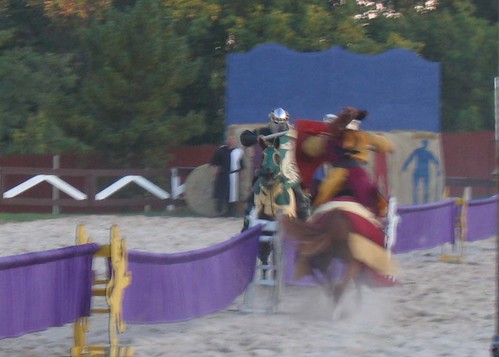
Sir Lukas and Lord Connor do battle
The Pennsylvania Renaissance Faire (thereafter to be referred to as the PRF) doesn’t just happen because a few hundred people shelled out the cash for costumes. No, it takes a large number of thespians dedicated to being anachronisms. Two such people are John Lukas (Joust Director and Horsemaster as well as “Sir Lukas, the bull of England”) and Kevin Stillwell (Equine Stunt Trainer as well as “Lord Connor, Prince of Stockwell”). You can check out their brief bios here. An interview with these fine men will follow after this short digression on how one can become part of the revelry that is the PRF.
There are three levels of performers at the PRF: The Bacchanalians are professional actors; The Black Friars are volunteers, although no less professional or devoted (some have been performing there for a dozen years); and then there are the independent performers hired for only a season.
Auditions for Bacchanalians take place in January, February and March and the selected actors arrive at the grounds in July and for the next six weeks live on the grounds and rehearse six days a week, eight hours a day. By the time the Faire opens in August, they are ready.
Black Friars are people who enjoy reenacting, but lead lives that are not centered around performing. These are teachers, engineers, dentists, and students as young as 15. “This is the best place for free training,” Karen Stefaniak, (Marketing/PR) told us. Auditions are held in February, the rehearsals in May. Some shows on the grounds are made up exclusively of Black Friars. “You have no idea how much training these people receive in improvisation, dialect, character history and stage combat,” Karen explained while we waited for the Knights to wash off the fake blood and take care of their steeds.
This year is the second year of the Fire Ride at the joust. John Lukas brought this act from Germany, where he competed in jousting tournaments. An international horse trainer was hired to work with the horses and the knights to perfect other tricks such as rearing on command or getting up on a pedestal.
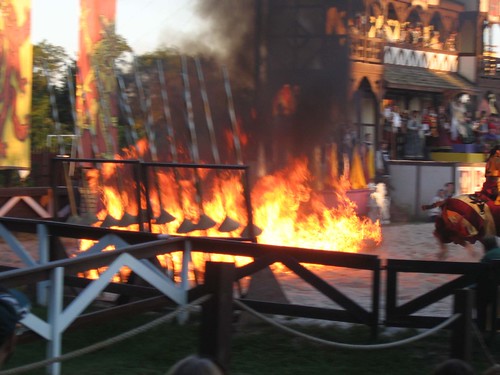
The utter chaos of the Fire Ride (we only caught the horse’s galloping rump and the flames)
We waited by the arena where a bloody battle for power over England has just taken place. After spending forty-five minutes or so running through twelve feet of sand a slew of medieval characters left the stage covered in (fake) blood and sweat. Finally, our subjects stomped out clutching huge beer mugs and radiating good cheer.
Meandering Entertainer: Often, when I see this [event], I tend to think it’s all smoke and mirrors. From the looks of you, you’re very red, very wet, I would think it’s a little more real than I expected. How real is it? How much training does it take?
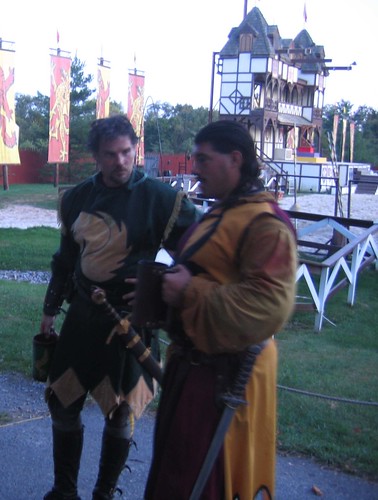 John Lukas: It’s very real. It is true that this is a choreographed show. Entertainment is the first and foremost principle of our company. However, you can not pretend what we do out there. It is 90% skill-based, at least. An actor on stage can pretend to be whoever it is he is portraying; you cannot pretend to be a knight out there, because you really need to know how to ride, you need to know how to joust, you have to know how to do all the skills. Like, when you ride the horse, and you ride through fire. That’s thousands of hours invested in that horse, I believe I’m the only person in the country that does that. So, these are top level skills that we portray.
John Lukas: It’s very real. It is true that this is a choreographed show. Entertainment is the first and foremost principle of our company. However, you can not pretend what we do out there. It is 90% skill-based, at least. An actor on stage can pretend to be whoever it is he is portraying; you cannot pretend to be a knight out there, because you really need to know how to ride, you need to know how to joust, you have to know how to do all the skills. Like, when you ride the horse, and you ride through fire. That’s thousands of hours invested in that horse, I believe I’m the only person in the country that does that. So, these are top level skills that we portray.
Kevin Stillwell: All the horses and all the knights and the squires also, we put in five weeks of rehearsal, about 40 hrs a week, before we open the show. And prior to that, John worked for several months to teach the horses all the special tricks. The rearing, the bowing, standing on a pedestal, riding through fire. So there is countless hours and once we open the show, we still rehearse three days a week, we ride twice a day, three times a week. So that’s another 8-10 hours of rehearsal. We constantly have to hone our skills, keep the horses sharp and the only thing that’s not real, for lack of a better term, is that we’re not actually trying to hurt each other! [as JL laughs in the background] We are very careful about where we hit on the shield, and the placement of our horses in relation to the fence and the other horses and the people on the ground. So it’s very complicated, very physically demanding. We have to be athletic and the horses have to be, obviously, in good shape as well.
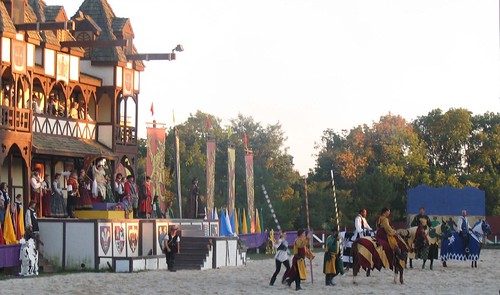
The Queen’s Knights
ME: So has anyone actually gotten hurt, in your extensive experience?
KS: You know, sports injuries.
JL: Sports injuries. The best way we could describe it is… the injuries we suffer are very much what a modern-day football player would suffer. In the end of a weekend, we’re covered in bruises, we get minor sprains. That’s the extent of the injuries. And I think we limit that risk, because of the fact that we train continuously. We demand that everybody be in shape.
KS: And the more you do it… John has been doing this for fifteen years, I’ve been doing it for nineteen… the more you do it, the more instinctive everything becomes. It becomes as natural as breathing, and it takes at least five years to get to that state of awareness, and that physical state of awareness, where you’re ready to react at a moment’s notice and really avoid any major catastrophes.
ME: Riding the horse through the fire trick, I hear you picked that up in Germany? I went to a fair in Germany, I think it was around Nuernburg, I don’t remember the area, and I saw that…
JL: Yup! They’re the only ones in the country that do that. I competed two years ago in the Wald Riekenberg tournament. I was the first and only American invited to compete for German Federation of Jousting. I got to train with them, I got to work with them.. great deal of experience I learned over there and I just wanted to bring some of it back to America.
ME: That was very awesome. So let me ask you, what is the demand for knights in this century, decade, and in general?
KS: That depends. What we do is… there are two different kinds of jousting in this country.
JL: This is really important to understand
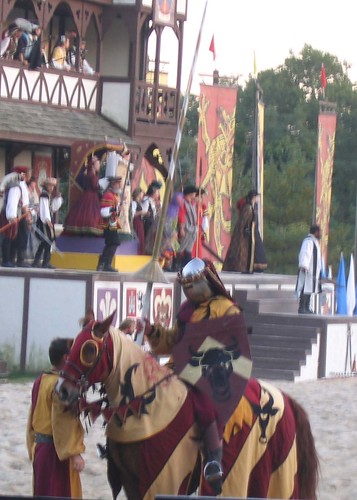 KS: We do a theatrical representation of a 16th century joust. It’s a piece of theater, you know, it’s high drama and very exciting action that’s choreographed for the sake of the audience. And the other kind of jousting in this country is competitive jousting. Where there are actually… It’s not choreographed… they ride big lumbering horses in full suits of armor and they just try to hit each other all the time, and honest to god, as exciting as that may sound, there is nothing more boring, for an audience, than to watch two guys, who don’t really know what they’re doing in an unchoreographed… it’s like going on to watch two guys fight in a street versus watching Mohammad Ali box in a ring. They’re very different things. You know, boxing is a sport, and jousting is a sport. For us it’s a combination of theatricality and real athletic events. It’s called “equestrian and human athletic events” You know, you can watch any idiot on a horse with a stick trying to hit his friend [general merriment]. It’s not very interesting (Editor: youtube lovers may disagree). When you put music and costumes and you have a huge fight that goes on around it and it’s well choreographed and executed well, which I think our show is, there is no comparison between the two.
KS: We do a theatrical representation of a 16th century joust. It’s a piece of theater, you know, it’s high drama and very exciting action that’s choreographed for the sake of the audience. And the other kind of jousting in this country is competitive jousting. Where there are actually… It’s not choreographed… they ride big lumbering horses in full suits of armor and they just try to hit each other all the time, and honest to god, as exciting as that may sound, there is nothing more boring, for an audience, than to watch two guys, who don’t really know what they’re doing in an unchoreographed… it’s like going on to watch two guys fight in a street versus watching Mohammad Ali box in a ring. They’re very different things. You know, boxing is a sport, and jousting is a sport. For us it’s a combination of theatricality and real athletic events. It’s called “equestrian and human athletic events” You know, you can watch any idiot on a horse with a stick trying to hit his friend [general merriment]. It’s not very interesting (Editor: youtube lovers may disagree). When you put music and costumes and you have a huge fight that goes on around it and it’s well choreographed and executed well, which I think our show is, there is no comparison between the two.
JL: And the skill base is higher, because, in order to be consistent, in an entertainment venue and to not hurt anybody, your degree of skill has to be that much higher, because you know, if I’m making a pass, and I’m going to hit him, there is a spot about the size of a quarter, on the edge of his shield that is a safe zone to hit, and if I don’t hit that spot, the lance can go in and actually take him off a horse. So, nobody else out there has that degree of skill that we can consistently hit those marks, with all that else going on and have horses that are trained to such a degree that we can just have fire and fireballs and have people running out there and keep that consistency, nobody else can do that.
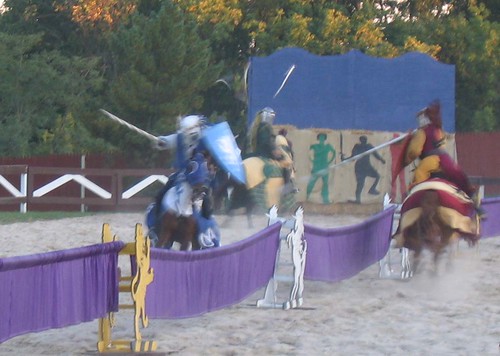
ME: So how often, would you say, out of the year, 50/50 would you do theatrical versus, I guess, sportsman jousting?
KS: We don’t do any competitive jousting.
ME: Oh, OK!
KS: And I wouldn’t do it.
JL: No, we laugh at that.
ME: Oh. OK. Now I know that.
KS: No offense to them! We spent… you know, I’m an actor by trade. I’m a director and a choreographer and I’ve spent the last 19 years, a goodly portion of my career as an actor, was spent doing this. And, you have a pretty short career if you spend your time really trying to whack each other.
ME: That’s true…
KS: And to me, that’s crazy. It’s crazy enough that we do this. But to really want to hurt someone, that’s way crazy. None!
JL: I did it once! But that was for the experience of having an international tour in Germany, so that was kind of worth it.
KS: That was the exception to the rule
JL: That was the exception to the rule. And even within that, although there were a lot of incredible equestrian things that they did, the majority, across the board was just.. not as good [KS laughs].. it just wasn’t!
KS: Well they do it sort of as weekend warriors, while we do this for a living.
JL: And that’s true, that makes a difference.
ME: The National Guards of knighthood.
KS: Yeah, and they do it for fun, and that’s great, and they go all out.
JL: You just have to understand, I make a living, 365 days a year, doing this on a professional level. While these reenactors, the people who come out to compete in these tournaments, don’t do that. They come out and compete, so in essence it’s a once a year “Oh, look at me and my twenty-thousand-dollar suit of armor that I bought” sort of thing… whereas, doing this as a profession… it’s comparing apples to oranges.
ME: Got it. So I think I’ll close it out, because you guys have to go do the finale. Do you ever use the knight in shining armor line, and does it ever work?
KS: Never used it.
JL: Nope, never used it and I don’t think it would work
KS: Somebody would have to be pretty dumb to fall for that and you know what, honest to god.. I mean, I have a girlfriend, John is married.. and it’s a… anybody that would fall for that, I wouldn’t be interested in. [General merriment]
JL: Different caliber. But there is a form of romanticization with the aspect of what we do… the knights in shining armor
KS: And that is part of it, but there is a safe barrier there too, a flirtation and playing in character and certainly helping people sort of fulfill some of their [pause] tamer fantasies [more general merriment] that’s just part of the job, that’s part of the job of everybody here.
JL: And then there is the whole thing with us being professional actors. In the end of the day, I’m not John Lukas the Bull. I’m John, you know, with my wife and kids.
~All photos by Beelzy
The last Faire was held on the 28th of October although the Professional Acting Company, which supplies the actors for the Faire, will put on Theater In the Mansion through November and December. For more information on the PA Ren Faire browse their home page (which is currently being renovated towards becoming more user friendly).
No trackbacks yet.